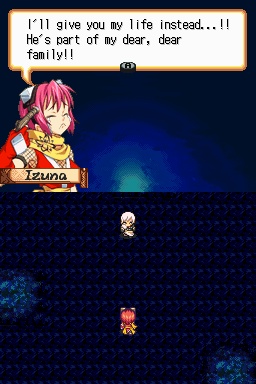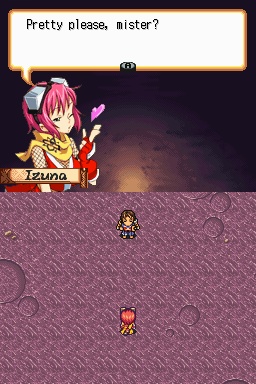Your sword is cracked. Your armor is broken. You're on the 25th floor of a dungeon, and it has taken you about an hour to get there. You've just stepped on an undetectable monster trap and scads of demons are now bearing down on you. The next time you attack or move, you will die and respawn at the local village without armor, items, or money...again. In short, you're screwed...again. Does this sound like good times? The folks at Ninja Studio apparently think so, and they're looking to bring that joy to the Nintendo DS with Izuna: The Legend of the Unemployed Ninja. While the game's barbaric difficulty will undoubtedly be agonizing for some, those with a high threshold for pain will find a perverse delight in hacking their way through this dungeon crawler.

In Izuna, you'll crawl through a randomly generated dungeon, scrounging for weapons, armor, and items to help you survive just a little while longer and make it to deeper and darker depths. Combat is turn based and as basic as it gets; you and the monsters surrounding you take turns beating on each other until you or they keel over. Even if unemployed, Izuna is still a ninja, so she can dish out serious damage with her fists. However, you'll also find battle claws, which are stand-alone and have both an attack and defense rating, as well as swords and armor, which can be equipped together but each only have an attack or a defense rating, respectively. The battle claws, swords, and armor come in different varieties, but for the most part, what you're able to find in the first dungeon is the same as what you'll find in the last, so there isn't much variety. These items also have what's called an "SP" and a love rating. The SP rating comes into play as you find talismans, which are essentially magical runes that you can either stick on your equipment or cast as a single-use spell to give you stat boosts or other benefits. Each talisman has a specific amount of SP attached to it, so you'll be able to layer them onto your equipment in accordance with how much each item is able to withstand. Of note, item SP is not to be confused with Izuna's personal SP rating, which acts as energy points and is consumed by using talismans in their single-charge capacity, as well as when you're hit. As for each item's love rating, well, let's just say that you probably shouldn't get too attached to any of your gear.
Many of Izuna's rage-inducing moments are inspired by the permadeath system it employs. Instead of humanely ending your game with a game-over screen and the opportunity to reload from your last save point, Izuna autosaves every time you enter or exit a dungeon. When you die and are forced out of a dungeon, the game saves and you respawn at the village, naked as a newborn (which is to say, with an empty inventory). So that awesome sword you found with a really high attack rating? Kiss it good-bye, because it's gone forever. But, hey, live to fight another day, right? Technically, you do have the option of exiting dungeons with a special talisman (assuming you can get your hands on one) to store certain items you'd like to hang on to in town, and you can also find a talisman that can send your gear back to the storehouse when you die; but these aren't very practical, because first, there's no way to get back to the floor you were on after you exit a dungeon other than fighting back down, and second, most items have a very limited amount of SP, and you're not going to want to waste it on superfluous talismans. So in practice, you're better off just rolling the dice and hoping to survive as long as you can (which typically won't be very long).
For the most part, death is avoidable if you're careful, and you can very easily regain all of your health when no monsters are in the near vicinity. But all too frequently you'll step on an invisible trap that slams you into a wall for half your life just as a horde of baddies rounds the corner. Or, you survive that horde, take one step, and land right on a monster-summoning trap. Traps are both a boon and a bane, as they add a lot of spontaneity and unpredictability to the otherwise random yet similar dungeons, but it's really frustrating that you have no way to detect them.
The game doesn't really come into its own until you've reached the fifth of seven dungeons. The first four dungeons essentially involve you being repeatedly and unceremoniously slaughtered in interesting and unlikely ways by monsters named Language Barrier and Super Marimo (which are typical of text-based games). Since the amount of damage your attacks wield decreases as your personal SP lowers, and pickups that increase your SP are few and far between, using talismans that drain SP isn't a particularly viable option in these early stages. However, by the fifth dungeon you'll probably have gained enough levels so that you'll have some SP to play around with, and you'll also start finding talismans that boost the SP capacity of the equipment you find. It's at this point that you can really start layering on talismans and experimenting with different combinations to create some really powerful, unique items--though, again, this makes it all the more devastating when you die and lose that pimped-out sword that you couldn't find a recall talisman for. For the sick and twisted among you, there is also a bonus eighth dungeon, which resets you to level one and has you dungeon-crawling until, presumably, you're taken away to the funny farm, much like in older games of this ilk.

Izuna's anime-inspired storyline will either bolster your spirits or crush them completely, depending on whether you can get onboard with its brand of humor. Izuna, who is a flirtatious, vivacious 16-year-old girl, accompanies her recently pink-slipped sensei, Grandboss, and two other companions to a small village. Upon arriving, Izuna promptly angers the village's gods, who curse the entire populace except for Izuna with various maladies. It then becomes your job to right your actions, appease the gods, and convince everyone that life is A-OK. Getting through the main storyline could take you anywhere from 12 hours to several weeks, depending on how long it takes Nintendo to repair and ship back your DS after you've snapped it in half in a moment of weakness. To publisher Atlus' credit, the story's script was expertly localized and is quite witty. Further to the publisher's credit, the decision to leave the short phrases and clips of audio in Japanese goes a long way in keeping Izuna's battle cries and townsfolk's well-wishings from becoming repetitive and annoying. The game also has a great soundtrack that, while not particularly memorable, features some well-composed, digitized tunes that are soothing and have a suitably Asian aesthetic.
In a sense, Izuna is what it is. Your ability to weather its unfriendly difficulty is the key factor in determining whether you'll be able to put up with this game or not. Its use of a permadeath system heightens your sense of risk-versus-reward to an extremely intense level, so as frustrating as it can be, it can be just as satisfying when you finally do emerge victorious from a particularly insane situation. Plus, the dynamic nature of never knowing when your items are going to break, where the next trap lies, or when yet another enemy will round the corner alleviates the otherwise tedious single-button combat mechanic and repetitive-dungeon feel. For those who like games with bite, Izuna brings the pain.